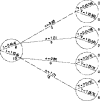Estimating causal effects from epidemiological data
- PMID: 16790829
- PMCID: PMC2652882
- DOI: 10.1136/jech.2004.029496
Estimating causal effects from epidemiological data
Abstract
In ideal randomised experiments, association is causation: association measures can be interpreted as effect measures because randomisation ensures that the exposed and the unexposed are exchangeable. On the other hand, in observational studies, association is not generally causation: association measures cannot be interpreted as effect measures because the exposed and the unexposed are not generally exchangeable. However, observational research is often the only alternative for causal inference. This article reviews a condition that permits the estimation of causal effects from observational data, and two methods -- standardisation and inverse probability weighting -- to estimate population causal effects under that condition. For simplicity, the main description is restricted to dichotomous variables and assumes that no random error attributable to sampling variability exists. The appendix provides a generalisation of inverse probability weighting.
Conflict of interest statement
Conflicts of interest: none declared.
References
-
- Rubin D B. Estimating causal effects of treatments in randomized and nonrandomized studies. Journal of Educational Psychology 197456688–701.
-
- Rubin D B. Inference and missing data (with discussion). Biometrika 197629159–183.
-
- Greenland S, Robins J M. Identifiability, exchangeability, and epidemiologic confounding. Int J Epidemiol 198615412–418. - PubMed
-
- Rubin Discussion of “Randomized analysis of experimental data: the Fisher randomization test” by Basu D. J Am Stat Assoc 198075591–593.
MeSH terms
Grants and funding
LinkOut - more resources
Full Text Sources
Other Literature Sources
Medical





